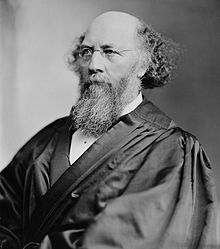Stephen Johnson Field
Stephen Johnson Field (born November 4, 1816 in Haddam , Middlesex County , Connecticut , † April 9, 1899 in Washington, DC ) was an American lawyer and judge at the Supreme Court of the United States .
Life
Stephen Johnson Field was the brother of David Dudley Field . At the age of 13 he accompanied his sister and her husband to Smyrna to learn oriental languages and stayed there for three years. After returning to America, Field attended Williams College in Williamstown and graduated from there in 1837 as top of the class. He then studied law in his brother's law firm and was admitted to the bar in New York in 1841 . He then practiced for a long time with David Dudley Field as a lawyer in New York. In 1849 he emigrated to California in the wake of the gold rush and settled there in Marysville .
In 1850 he was first elected Alcalden (Mayor) of Marysville and then in the same year as representative of Yuba County in the first parliament of California . There he introduced numerous laws, mainly inspired by his brother's laws for New York, on the establishment of the judiciary, criminal law and civil procedure law . His draft laws on mining law became the model for corresponding laws in the western US states. In 1857 he was for the Democrats as a judge on the Supreme Court elected the State of California. He was the successor to David S. Terry , who had killed the US Senator David C. Broderick in a duel and therefore had to resign. In 1859, Field became the presiding judge of the court, and held that position until he was appointed to the US Supreme Court. Field was appointed Justice of the United States Supreme Court by Republican President Abraham Lincoln in 1863. In 1873 he was a member of a commission that revised California law ( California Code ) and in 1877 he was a member of the electoral commission set up to decide the presidential election in 1876 . After two years of pressure from his colleagues because of his increasing senility, he resigned from his office on April 9, 1897, because he was then the long-serving judge at the Supreme Court.
An attempted assassination by former judge David S. Terry, who attacked Field in August 1889 after a lost trial at a train station, caused a stir . Terry was shot dead by Fields' bodyguard.
Field was a Democrat partisan who was heavily involved in state rights . On the other hand, he also believed in a strong union and had sympathy for abolitionism , which is why he was able to live with the republican view held by Lincoln during the Civil War . At the Supreme Court he stood out as a rather conservative judge who opposed the influence of the government on the economy and was instrumental in expanding the jurisdiction on the 14th Amendment to the United States Constitution . He was an advocate of the racist laws against Chinese, voted with the minority in Strauder v. West Virginia against admitting black jurors despite the 14th Amendment, and was in the majority in Plessy v. Ferguson established the principle of Separate but Equal as the basis of racial segregation in the southern states . The decision of Plessy v. Ferguson was founded in 1954 by the Brown v. Board of Education , which only affected the public school system, and later other judgments effectively but never formally repealed. In US historiography, Plessy is widely considered to be the worst judgment of the Supreme Court.
literature
- Paul Kens: Justice Stephen Field: Shaping Liberty from the Gold Rush to the Gilded Age . University Press of Kansas, 1997, ISBN 978-0-7006-0817-1
- John Norton Pomeroy et al. a .: Some Account of the Work of Stephen J. Field as a Legislator, State Judge, and Judge of the Supreme Court of the United States . First edition 1881, Google Books
- Field, Stephen Johnson . In: Encyclopædia Britannica . 11th edition. tape 10 : Evangelical Church - Francis Joseph I . London 1910, p. 311 (English, full text [ Wikisource ]).
Web links
- West's Encyclopedia of American Law, edition 2. Copyright 2008
- Stephen Johnson Field at PBS
- Stephen Johnson Field. In: Columbia Encyclopedia
| personal data | |
|---|---|
| SURNAME | Field, Stephen Johnson |
| BRIEF DESCRIPTION | American lawyer and US Supreme Court Justice |
| DATE OF BIRTH | November 4, 1816 |
| PLACE OF BIRTH | Haddam , Connecticut |
| DATE OF DEATH | April 9, 1899 |
| Place of death | Washington, DC |
